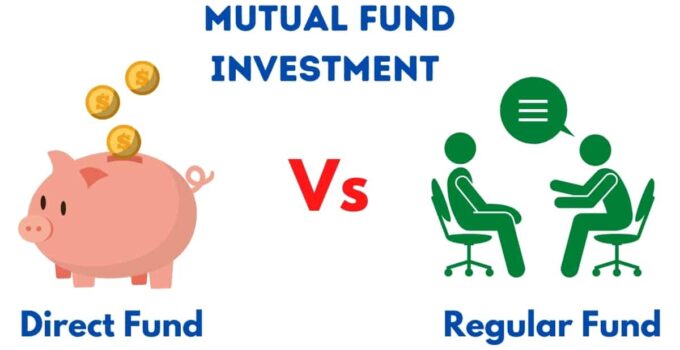As mutual funds have become an investment option, SEBI has come up with new rules and regulations to make it easier to invest. One such change came into effect on January 1, 2013, with two options available to investors.
Mutual Fund Investment Plan Options
Investors can invest in mutual funds in two ways – one is a direct plan and the other is a regular plan.
Direct Plan
This type of investment, the investor has to study for himself by visiting the website of each mutual fund or based on other websites, taking information. Mutual fund direct plans have a lower expense ratio. Its net asset value (NAV) also differs.
Regular Plan
This type of investment requires the investor to need to hire a financial advisor. In a mutual fund’s regular plan, the fund’s ‘expense ratio’ is slightly higher than the direct plan. But this is where the investor can get services from a consultant. A financial advisor is always there to help you.
In early 2013, companies as well as institutional investors benefited from these regulations. These types of investors have benefited from this direct plan as they have a team of expert analysts who do their own research, as well as their investment amount is very large. As the assets of mutual funds have been growing rapidly since 2013, so have the investments of companies and institutions in direct plans.
At that time, even some ordinary investors started preferring to invest in a direct plan to save a little difference between the expense ratio and the NAV. A ‘direct’ plan means that you can do whatever your mutual fund advisor does. You decide which plan to invest your money in. You are expected to study it yourself.
Even then, it is up to the investor to review the plan from time to time, when to exit the plan, when to switch to another plan, etc. You also need to make sure that you do not become stressed while doing all this. It’s not that hard at all. If you can use these statistics properly with the knowledge of mutual funds, then a direct plan is for you.
Difference Between Direct Fund & Regular Fund
| Features | Direct Fund | Regular Fund |
|---|---|---|
| Expense Ratio | Lower Expense Ratio | Higher Expense Ratio |
| Net Asset Value (NAV) | Higher | Lower |
| Returns | Higher | Lower |
| Investment Advisory | No, Advice | Yes, Available |
| Portfolio Analysis & Tracking | By Self | By Agent |
| Market Knowlage | Yes,Required | No, All Funds manage by Fund Mangers |
Mutual Fund Investment By Mobile Apps
Some ordinary investors started investing in direct plans just by looking at the order of past returns of the funds. This was followed by a mobile app that provides online investment services in Direct Plan. This mobile app are easy for investors to use and investors are attracted to it.
Although mobile apps are now offering investment services in direct plans, there is a hidden value in their operating system that is not visible to investors. While these mobile apps may seem easy to invest in, they do not offer full consulting services. Investors were happy to gain a little more from the NAV difference during the stock market upswing.
India’s Top 6 Direct Investment Mutual Funds Mobile Apps
| App Name | Ratings In Google App Store | Total Number Of Reviews | Total Downloads |
|---|---|---|---|
| Groww | 4.4 (Star Rating) | 286,730 | 10,000,000+ |
| ETMONEY | 4.5 (Star Rating) | 117,553 | 5,000,000+ |
| myCAMS | 4.4 (Star Rating) | 68,577 | 1,000,000+ |
| KFinKart | 4.3 (Star Rating) | 35,917 | 1,000,000+ |
| Zerodha Coin | 4.4 (Star Rating) | 13,836 | 1,000,000+ |
| Paytm Money | 4.2 (Star Rating) | 92,326 | 5,000,000+ |
Role of Mutual Fund Advisor
A financial advisor who has at least one or two years experience of market fluctuations. The first step is to see if your advisor is competent in terms of experience, knowledge and technology. The advice given by such an experienced consultant is a very important part of the investment structure he has made.
An advisor in your investment planning is always present at your behest as your charioteer in your wealth creation. He tells you the right investment plan according to your needs and objectives, and he also keeps an eye on your investment. He also gives you guidance on investing from time to time.
Mutual Fund Advisor is working very hard for this. Collects information for you by attending various seminars as well as keeping in touch with mutual fund managers. Advisor is investing in technology to make his service more efficient. KYC keeps investors stress free by paying close attention to nominations, address changes, bank account changes, fund statements, tax saving advice, as well as various such services.
For all this work, if your financial advisor receives a mutual brokerage or fee of 0.30% to 0.90% from the mutual fund, there is nothing to be offended by the investor. This is because a competent advisor pays a higher return on investment than the fee amount.
Note: Investing in a mutual fund should be for a long period of time, so the investor should appoint the right advisor while planning.
Conclusion
In the last few months, SEBI has further narrowed the expense ratio of mutual funds, at which point the gap between direct and regular plans has narrowed. Therefore, by investing in a direct plan, you should achieve your long-term wealth creation goals by choosing a good advisor rather than making a loss in times of ups and downs.
Take a Look




